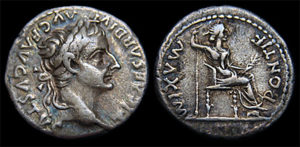Giving Back to Caesar and God: A Curious and Challenging Twist
They brought the coin, and [Jesus] asked them, “Whose image is this? And whose inscription?” “Caesar’s,” they replied. Then Jesus said to them, “Give back to Caesar what is Caesar’s and to God what is God’s.”
Mark 12:16-17
 In the last couple of days we have been examining Mark 12:12-17, an interaction between several Jewish leaders and Jesus. They had trap him, asking Jesus a question about taxation, which, no matter his answer, seemed to force him either to denounce Rome or to disappoint his followers. Yet, Jesus’s response to the trick question, using the image and inscription on a Roman coin, enabled him to escape from the trap. Since the coin had the image of Caesar and an inscription identifying him, Jesus was able to say, “Give back to Caesar what is Caesar’s and to God what is God’s” (12:17).
In the last couple of days we have been examining Mark 12:12-17, an interaction between several Jewish leaders and Jesus. They had trap him, asking Jesus a question about taxation, which, no matter his answer, seemed to force him either to denounce Rome or to disappoint his followers. Yet, Jesus’s response to the trick question, using the image and inscription on a Roman coin, enabled him to escape from the trap. Since the coin had the image of Caesar and an inscription identifying him, Jesus was able to say, “Give back to Caesar what is Caesar’s and to God what is God’s” (12:17).
When we first hear this, we are inclined to think that Jesus missed an opportunity to critique Rome and its oppressive rule over Judea. “Give back to Caesar what is Caesar’s” seemed to bless Roman sovereignty, which was felt deeply in the exercise of paying taxes to Rome. But, when we pay closer attention to what Jesus said, and when we note carefully the context for this saying, we realize that he was in fact offering a profound critique of Rome and its blasphemous authority.
The denarius that Jesus used in this story featured an image of Tiberius Caesar, the son of Augustus, and an inscription identifying him. (You can see a photo of this kind of denarius above.) Tiberius was the Roman emperor from AD 14-37, the years in which Jesus was actively preaching, so coins in this era would feature Tiberius’s image. Yet, the inscriptions on the coin did not merely identify the emperor. The reverse of the coin called him “High Priest,” since he, as emperor, was also the high priest of the Roman imperial cult. This inscription would surely have been offensive to the Jews, who recognized only one true high priest, who served in the temple in Jerusalem. But, even more scandalous was the inscription on the front of the denarius. Rather than simply identifying the image as “Augustus Tiberius,” it read in translation “Augustus Tiberius, son of the divine Augustus.” Son of the divine Augustus! Tiberius was honored on the coin as the son of a god. After his death, according to Roman custom, he would be deified as well.
In light of this context, we hear Jesus’s statement in Mark 12:17 differently. “Give back to Caesar what is Caesar’s and to God what is God’s” implies a stunning denial of the Roman claim that their emperors are divine (or become divine after death). For Jesus, there is only one God, and this God is not Augustus Caesar, Tiberius Caesar, or any other Roman emperor. The one true God is the God of Abraham, Isaac, and Jacob, the Heavenly Father of Jesus.
Today, most of us don’t deify our national leaders. And when American coins proclaim “In God We Trust” next to the image of a deceased national leader, we are not supposing this leader to be divine. Yet, many of us do fall into the trap of treating things other than the one true God as divine. For some, work becomes rather like a god. For others, family is virtually divine. Among the things we “deify” are country, political cause, church, material gain, success, security, friends, appearance, youth, and power.
Jesus reminds us today that there is only one God, and that whatever else we put in God’s place does not belong there. We are to give back to God what is God’s, including our whole lives, our ultimate allegiance, and our full worship. We acknowledge God alone as the one true God, the one who became human in Jesus, the one who calls us to live our lives for his purposes and glory.
QUESTIONS TO CONSIDER:
As you think about your life, what “gods” might you be tempted to put first in your life?
How might acknowledging God as the one true God make a difference in your work? In your family? In your dreams for the future?
PRAYER:
Gracious God, you alone are God. You alone reign above all things, King of kings and Lord of lords. You alone deserve my full allegiance, my worship, my total service, my deepest love.
Lord, you know how easy it is for me to serve other “gods.” I’m tempted to put other things first, perhaps out of pride, or fear, or envy, or greed. Forgive me, Lord, when I dethrone you in my life. Help me, I pray, to make your first in all things, to honor you as God in everything I do.
All praise be to you, God of all, God of me. Amen.
Explore more at the Theology of Work Project online Bible commentary: Taxing Issues (Luke 19:1-10; 20:20-26)
Image Credit: By DrusMAX – Self-photographed, CC BY-SA 3.0, Link


Mark D. Roberts
Senior Fellow
Dr. Mark D. Roberts is a Senior Fellow for Fuller’s Max De Pree Center for Leadership, where he focuses on the spiritual development and thriving of leaders. He is the principal writer of the daily devotional, Life for Leaders, and t...


